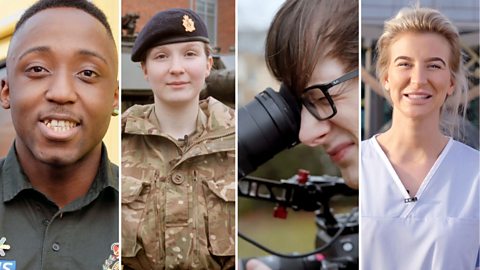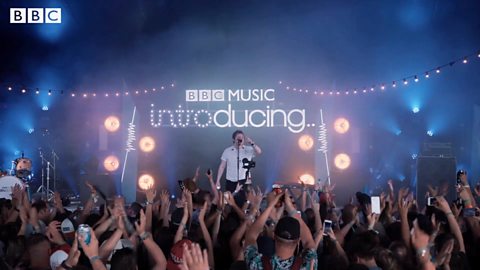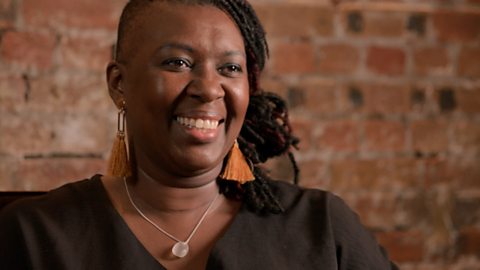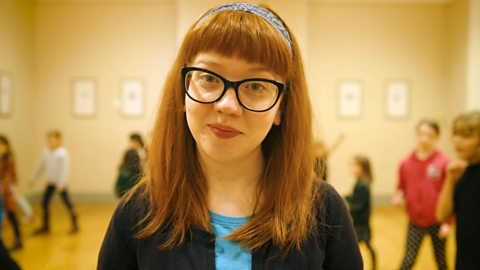To celebrate National Careers Week 2022, Bitesize Careers have put together a special panel to discuss careers in music and arts. What's it like to work at Abbey Road Studios, Island Records and Coronation Street? Scroll down to find out!
Visit our Q&A panels collection where you can also watch career panel discussions on healthcare and science, media and journalism, sports, and technology.
Music and arts panel discussion with Nadia Jae
Nadia Jae talks to four people who work in varied roles within the music and arts sectors. They talk about what their jobs are really like and reveal their tips and advice on how to get a foot in the door, as well as personal experiences and challenges they have overcome and what the future career prospects may be in their job sectors.
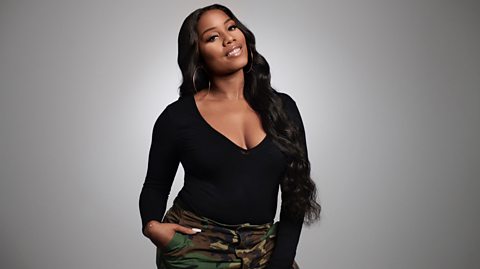
Nadia Jae is a presenter on BBC Radio 1Xtra, where she has been presenting the Breakfast show since 2020. She has also presented for the likes of BAFTA TV and MOBO Awards and has interviewed many celebrities such as Idris Elba, Jamie Foxx and Craig David.
Meet the panellists
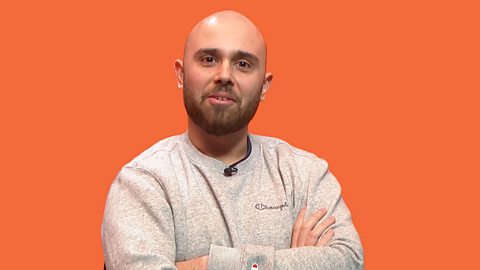
Callum Ross, Island Records
Callum's an A&R (artist and repertoire) for Island Records. His job involves talent scouting and overseeing the artistic development of recording artists and songwriters.

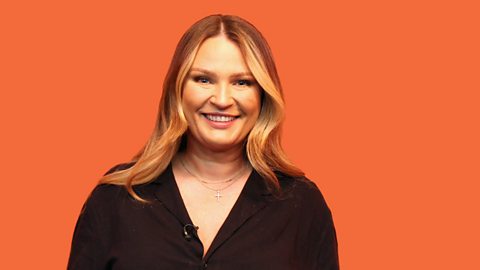
Cassie Lomas, Cassie Lomas Makeup Academy
Cassie's a makeup artist and businesswoman. She is the founder of Creatives Agency and has worked with artists such as Lady Gaga, Selena Gomez, Rita Ora and Camilla Cabello.

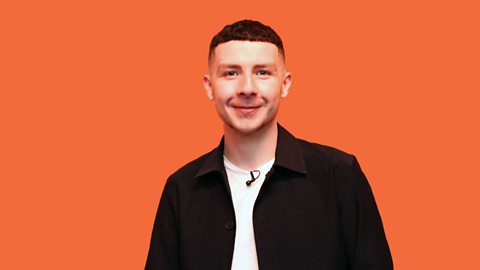
Jack James Ryan, Coronation Street
Jack's an actor, currently playing Jacob Hay in Coronation Street. He graduated from the Guildford School of Acting (GSA) in 2018 and is a trained singer and dancer.

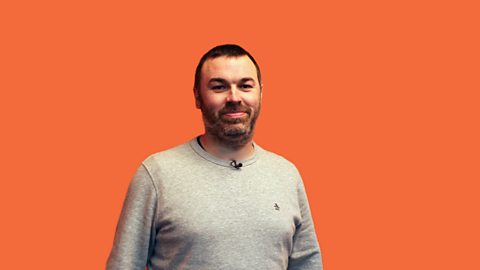
Paul Prichard, Abbey Road Studios
Paul's a recording and mixing engineer at Abbey Road Studios. He joined in 2007 on a placement scheme from the prestigious Tonmeister course at University of Sussex.

Intros and how it all started
- How would you describe your role?
- What sort of day-to-day tasks does your job involve?
- How did you first get your career journey started?
Nadia:
So, it’s my absolute pleasure to introduce our panellists today. We’ve got Paul, we’ve got Cassie, we’ve got Callum, and we’ve got Jack. How are you guys?
Paul:
Good.
Callum:
Good
Jack:
Very well thank you.
Nadia:
Good to have you. No worries. I'm excited, we’re going to get some real gems today. So, I'm going to start with Paul Pritchard. So you're a recording and mixing engineer at Abbey Road Studios.
Paul:
That is correct.
Nadia:
So, tell us a little bit about that.
Paul:
My job as a recording engineer is to set up all the microphones, find out in advance like, what we’re recording, and make things sound as good as possible.
Nadia:
Next, I'm going to move on to Cassie. So, Cassie Lomas is a makeup artist, and you also have the Cassie Lomas Makeup Academy, and creative agency. So, tell us you know, what, what that entails.
Cassie:
Well, I started out doing makeup quite young. Erm, so I’ve always been a makeup artist, it’s kind of all, all I know really. But I also did a business degree when I was younger. So, that’s really helped me as well, because once I got to about, must have been about thirty I thought right, what else, and that’s when I opened my business. So, yeah, now I juggle the two. Still fly around the world a little bit, but maybe not as much as I used to. And I mainly do celebrities, and music artists' makeup. So, we’ve probably crossed paths at some point in, in the past.
Nadia:
All right, next, I'm gonna go to Callum. A&R manager. For those that don’t know it’s artist and repertoire manager.
Callum:
Correct, yeah.
Nadia:
At Island Records and Universal Music. So, what does that look like?
Callum:
Working as an A&R, you deal with the artists that already exist at the label. You sort of are tasked with going out, and finding the most I guess exciting newest talent to bring in to the label. Erm, there's a lot of meetings. It’s a very social job, a lot of gigs, a lot of late nights, a lot of early mornings. But yeah, Island is an amazing company with loads of incredible musical heritage. So, it’s yeah, no day is the same.
Nadia
All right, and last but not least, Jack. So, you're an actor, currently in Coronation Street. Just in layman’s terms you know, what's your day, your day look like?
Jack:
So, for me, like, every day is different, which is why my job is so exciting. That’s why I love doing what I do, but you know you could be filming up to ten scenes a day, which erm, means lots of lines to learn. So, but yeah, the, yeah, it’s really exciting, 'cause as I say, every day is different.
Nadia:
Great, okay, so, I'm going to come back to you, Paul. So, as a sound engineer, your job’s quite important. How did you get into it?
Paul:
I mean like, everyone’s into music. That’s sort of, sort of, a sort of universal, it's like food, everyone loves it. And I was no different growing up. I really liked guitars, playing guitar, and, but then I found myself more like, buying all the, like, the effects pedals and things that go with it, and sort of fiddling around with the sounds. And I got so much more interested in that side of things, rather than being on stage, or, or performing. And then I just sort of followed that, went to university to study music, and sound recording. And then, I was really lucky, cos my uni did a, it’s a four year course, and on the third year has a placement year. So I did two years of study, and then was lucky enough to get a job at Abbey Road for a year, as an intern sort of, makings cups of tea, and moving chairs around. And you know - super important - yeah, yeah, all that, all that stuff, and then I've been there ever since.
Nadia:
Actually Paul, we’ve got a little clip of you working your magic, let’s have a look at that.
(CLIP PLAYS)
Nadia:
That sounded great, that was Glass Animals.
Paul:
Yeah.
Nadia:
That is great, and I think it’s really important for those that are watching to see that… like I said, on, on stage they look great.
Paul:
I'm not in that video. [Laughter]
Nadia:
No, that’s the point, exactly.
Paul:
Yeah, yeah, so many jobs that exist that are sort of behind the scenes. I mean even here today, like, loads of people, and they're all required to make things like that happen. They don’t just come out of not-, nowhere. But yeah, my role is then finding out the band, what song they're doing, what they play on that song. So many records get now, get made now where things are recorded separately, in different places, which is, which is great, but sometimes the sessions are great when it’s just like, there's a band, they play, we set up, you know, and then all go home at the end of the day. Yeah it was really good, I really enjoyed it.
Nadia:
Thank you for explaining exactly what happens there, cos the magic is there, as we’ve seen in the product. So I'm going to move over to Cassie. So, you're a makeup artist, and you also own a business. So, how do you balance the two? What's your day-to-day look like?
Cassie:
Well, there, there's no, there's no normal day-to-day, that’s the thing. And I think that’s, again, what I love about my job, because I, - when I first started out in makeup, um, I tried lots of different things. There's so many different areas you can go into in makeup, believe it or not. You could do TV, you could do fashion, you could do bridal… you know, lots and lots of different areas. And I tried all those things at the beginning, because I wasn’t really sure what my forte was going to be at that time. But what I noticed from that is that I didn’t enjoy going to the same place of work every day, and doing the same thing. I liked the spontaneity of being on a shoot one day, and being at a TV the next, and then teaching, you know, another day. And, and I think that’s why my career kind of moved along the music and celebrity path, because when you work with celebrities and music artists, music artists particularly, they get to do everything. So they get to do the TVs, they get to do the red carpets, the editorials, the advertising campaigns, and I love that, not knowing what I'm doing.
Nadia:
And we’ve been talking about what you do, and we’re actually going to get into a clip to see what a day in the life looks like with Cassie.
(CLIP STARTS)
Cassie:
Well, it’s been a while, but we’re back, and basically, Charley’s got a night out, so I'm doing her makeup.
Charley:
Yeah.
Cassie:
So, we thought we’d film it, and give you guys some tips. So basically, this is a really, really large brush, and it’s brilliant for applying primer, foundation. I'm going to keep the eyes really simple. This cream bronzer I absolutely love. Blend into the face, just to take off any excess product that I've put on her skin.
(CLIP ENDS)
Cassie:
That’s my sister that I'm working on, and she's an actress, and we started doing those little tutorials just as a way to see each other. But it was just something that we, we did for fun initially, and that s one of the main bits of advice that I can give people. When, when going into a career, to do something that you love, because doing something fun, that you love, and that you can put all your passion and energy into does turn out into, into something fruitful in, in the long term I think.
Nadia:
All right, so thanks for that Cassie, that was absolutely amazing. It’s really nice that we’re getting all different versions of what you guys are doing, cos there are good bits, and there are bad bits, and there's other bits that we’re gonna get into. I'm going to move on to Callum. Even me who’s in the music industry, it can sometimes be really hard to pinpoint what an A&R does, but your, your role is so integral, it’s so important for the artist. How did you get into it, and how was your journey, what was it like for you?
Callum:
I just knew that I wanted to work in a creative environment. I wanted to work in music. When I started I didn’t know what it meant, didn’t know what the A was, didn’t know what the R was. I just knew that I wanted to be in the building where the music was being made, the artists were coming in, just part of that environment, learning about A&R is, learning really the fundamentals of building a relationship with your artists, knowing that the artist comes first, and you're there to, to sort of help facilitate, amplify. A lot of artists don’t have the luxury, or rarely do, of being in the building where it’s happening. So, it’s your job to fly the flag, and to be the champion, and to be the voice, and, you know, really help support and create making amazing music.
Nadia:
Well, we’re going to some images of some, some of the artists you’ve worked with. All right, so we’ve got The Weeknd, we’ve got Disclosure, and Arianna Grande, to name a few. Those are people you actually work with, what a job!
Callum:
You get the luxury of meeting a lot of incredible artists, and they're just normal people, and really, they're just lovers of music. There's a lot of gratitude I think, from artists that you don’t see, because they do realise that there is, you know, could be a team of up to, some people have a team of up to twenty, thirty people.
Nadia:
All right, we’re going to move over to Jack, because you're an actor in one of the biggest shows, and you know I’d - it’s obviously not always like that in the beginning. So, I want you to explain to us about your journey into acting, because I think it’s important, as all of you have touched on, how long it can sometimes take, how many teas and coffees you might have to make.
Jack:
So yes, started from like quite a really young age, and the main things I was doing was just getting involved in er, school plays, like the choir, like anything that was creative in school that I could I’d get involved with. Then sort of went to college, did a BTEC there, and I got to, to act every day all day, and I was like this is, this is, this is the life, this is cool this. Then I went on to university, and studied acting there, and then after I graduated it was, it was a slog. It was, it was a proper slog. Like I didn’t just graduate, and jump straight into work. Like, um, even just to get an agent who would represent me to get me work, like that was, that was really, really difficult. Once I did get an agent I started just doing little bits, so little day player roles, going into a series, and doing like a couple of lines here, a couple of lines there, and then yeah, and then I got Coronation Street, which is, which is, yeah, it’s changed my life, and it’s been, it’s been really, really, really great. And you know it’s, for me, being from Manchester, it’s like so iconic here, so my mum was buzzing when I got that.
Nadia:
I can imagine!
Jack:
Yeah, she was proud that day.
Nadia:
We’re gonna have a look. We, we’ve gotta go to a clip, let’s see you in action.
(CLIP STARTS)
Jacob:
You know, this is assault.
Steve:
You cheeky little beggar!
Jacob:
Look I told you, I haven’t done nothing.
Steve:
Oh yeah.
Tracy:
Carla, do us a favour, eh, tell everybody the party’s off.
Steve:
Please tell me Amy's okay.
Tracy:
I don’t know Steve. She must have gone out somewhere.
Jacob:
Look. On my life, I, I, I never took nothing, just search me.
Steve:
Oh the police will be doing that pal, don’t you worry.
Tracy:
Yeah, and if you're so innocent, how come you’ve put a lock on the front door, and you did a runner out the back?
Jacob:
I didn’t, I wasn’t.
Steve:
Oh cut that, I saw ya.
Jacob:
Just search me, yeah? Please, I can't get in trouble with the police.
Steve:
[Laughs] Well, I'm sorry mate, if you can't do the time, don’t do the crime.
(CLIP ENDS)
[Laughter]
Nadia:
Can I ask, is it weird watching yourself on screen?
Jack:
It’s so cringe watching yourself back, but it’s also a really good tool to like, analyse kind of the work that you’ve done, and you know you always want to kind of better yourself and the, the next stuff that you do, and you always kind of build upon that. So for me… I know some actors who just refuse to watch themselves. They're just like no, I'm not going to do it, I'm not going to watch myself, but I like to do it, because yeah, I like to analyse what I'm doing, and then like kind of build upon that, so, yeah.
Nadia: Yeah, you have to.
Every day is different which is why my job's so exciting, it's why I love doing what I do.
Jack
Journeys so far
- Have you experienced setbacks along the way in your career?
- What were you like at school compared to now?
- What did you study at school and do you use that knowledge now?
Nadia:
I want to touch on setbacks, and issues you might have had in your career. I'm going to go with Callum.
Callum:
When you get into a job that is competitive to get into, - and you know that there's a queue of people behind you that would snap it up if you, you know for whatever reason didn’t take it, or got let go, you put a lot of pressure on yourself to be perfect all the time, cannot make mistakes, and the biggest thing I've learnt is to be okay with making mistakes, if it’s honest, and you can learn from it next time. Because the reality is, the biggest artists in the world, presidents of labels, everyone makes mistakes. It’s about being, about being honest, and I think just, you know, learning and, and keep bettering yourself. So, I’d say that’s the biggest thing I've learnt.
Nadia:
What about you Cassie, what's an obstacle that you’ve had to overcome?
Cassie:
So, obstacles, I think, just to mirror what you said, you know when you're trying to get into something that’s competitive, and something that’s not what I would class as a normal job, um, it’s hard, because there's, the guidelines are not as clear. So, there's no rulebooks of what you have to do, and how to act, and how to get there, but just kind of finding that path, and, and staying on it is the biggest obstacle, because it’s so easy to give up. It’s so easy to say hmm, they've not got back to me, or no one’s replying to my emails, and I'm not good enough, I'm not going to be able to do this. But actually, what you have to think about is, I can do this. I am good enough, and if I'm not good enough yet, I'm going to make myself good enough, and to keep on that journey, just keep hammering the doors down, and don’t stop until you’ve made yourself proud.
Nadia:
What about you Paul? What obstacles have you had to overcome, that you, you know now that you're proud of, or?
Paul:
I think I've always been pretty lucky with a lot of things, but certainly when I first got a job, and then I remember working out one day how much I got paid per hour, and was like argh, yeah, that, I could go and yeah work in a supermarket, [P: Yeah] like I used to do, and then I’d actually get a bit more. [they chuckle] So, it’s just working through that, and I think, I think where I'm at now it’s, it’s a lot better, and I think the world is sort of opening up, and waking up to the, the fact that people’s time is [P: Money], is, is worth something. And, and you're not going to get loads to start with, but you do need something. Any company now worth working for is going to pay you enough to get there, and enough for rent, and it’s not going to be a lot, and you'll have a box room, but you’ve just got to work.
Nadia:
For me, I always say to anyone trying to get into any of these industries, just be prepared to work for peanuts for a bit, just a little bit. It’s character building. It’s stressful, but the rewards are just, you know.
Paul:
It’s not a, a one goal thing, it’s a whole years of mini goals.
Nadia:
And also staying a student in what you do as well 'cause you're constantly learning.
Paul:
Oh yeah, all the time. There's never anyone who’s like, owned it who knows everything about, that’s not a thing.
Nadia:
So, last but not least, Jack, I want to ask you: any obstacles that you overcame?
Jack:
Being from a working class background is, is never easy to, to kind of get into these types of industries, but I think you know, as long as you, you kind of have that love and that passion, you know, you, you're going to cut through. Um… [exhales] back when I was eighteen I actually had a run-in with, with cancer. I was diagnosed with testicular cancer, and that was like a huge, huge obviously time in my life. I, I'm in remission now, I'm completely, I'm in recovery which is amazing, and I'm all good, but as much as obviously it was a negative time in my life, it re-, um, I do think some of the most difficult times in your life kind of puts everything into perspective. And after that happened I was like, I was, I, I mean I knew what I wanted to do, I knew anyway, but I was even more clear then. I was like, right, okay, I've got no more time to wait, or, or, or no more time to waste. So I'm just going to go for this with, with everything that I've got, and I felt like that new sense of, that reenergised sense of energy was impassioned, was just like, just what I needed to kind of progress on in my career, so.
Nadia:
Especially at your age as well… Yeah, man. I think people don’t realise that cancer can at any time in your life. It’s not just you know, - we always kind of look at maybe when you're older, or a certain lifestyle you might have had, but actually, you know, you were eighteen, and just starting things out. And I think it’s really great that you shared that, that you're a clear example that that hasn’t done… that in your life, so that is great. Thanks for sharing. So what we’re going to do now, we’re just going to rewind the clock. It’s all great us sitting here, we’re all adults now, we’ve kind of got into our careers, but at some point in our lives we were teenagers. So, we’re going to go back in time to what we were like when we were doing GCSEs. So I'm going to kind of ask each of you, you know about what you were like as teenagers, um…what your schooling was like, and, and how that kind of helped you to where you are now. I think I'm going to start, I think I'm going to start with Cassie.
Cassie:
So I went to a girl’s grammar school, so it was very academic, and we were kind of encouraged into academic careers, which I would class as being a doctor, lawyer, accountant, that kind of thing. And one day someone was coming around the classroom with like, these evening courses that the college had available. And then I saw makeup, and I thought hmm, well, I've been a model, so I know that I could do makeup, and I, I had contact with an agency. So, I thought well, if I do this makeup course I could just get a job with this agency. What I did is I did, I did the makeup course. I did it at college, and at the end I went to this agency, and I was like I've done a makeup course, can I be on your books, and, and be a makeup artist. And you know, they turned around to me and said no, all our makeup artists have been to school in London, and I'm sorry, you know, it, it doesn’t really work like that. So, I thought right, well I’ll, I'll do it then, I’ll, I’ll set about and just go and do it myself, and you know with a lot of years of, of hard work, that, that’s kind of, of what I did, and I just didn’t take no for an answer. And you know, I ended up getting that agent.
Nadia:
I love that, the resilience there is important, because people assume maybe you'll just get yeses all the time, and noes are always that kind of, you know, it’s a setback, but it, it will be a comeback at some point.
Cassie:
You know you learn with age that it, you, you’ve got to prove yourself, you’ve really got to prove yourself. You don’t get to where you are by just people opening doors for you. You’ve got to push those doors open, and you’ve got to keep going.
Callum:
I think that’s a valid point, you have to learn to embrace the rejection, cos it can be very disheartening, and it’s easier to not be rejected again. So you can just be like och, do you know I’ll just leave it, but you have to sort of twist that term in your head, and turn a negative into a positive, and rejection just means: wasn’t my time this time, so just go again, and again.
Nadia:
A ‘no’ is a ‘yes’ to something better, I always say.
Callum:
A hundred percent.
Nadia:
I was going to come to you actually, Callum. The school version of you, and now, were they mirroring images? Was it like you were the complete opposite? What were you like at school, and how does that help you now?
Callum:
I think the school version of me was just keep your head down, get on with it. I think the, the main thing for me is that the curricula side of school was almost like just get on, do it, and I sort of wished that…the, the way people approached careers was like, okay, what do you do outside like school? Like what do you love doing, cos what we’ll do is then we’ll try and tailor that to what you want to do, rather than being like, okay, these are the subjects that you do, just pick something that’s involved in that. It, it takes a while, and I think if you don’t fall into your career straight from your GCSEs, it’s not a bad thing, you know.
Nadia:
Yeah, it gives you time to grow.
Callum:
It takes time, of course.
Nadia:
What about you, what was you like at school, and what was the child version of you like in comparison to now?
Jack:
I was super creative from a young age, I always liked to just – yeah, I was, I was always up doing everything, just the, the – my attention span was kind of all over the place, and I, do you know what I mean? Like that was, I kind of think that with quite a few creative people that you tend to find that, that from a young age they, they're a bit more like that, but for me, like I came from a very, very working class background. And creative industries weren't, uh, were hobbies. They weren't jobs. They weren't proper jobs. They were hobbies. So I, you know, I was just so lucky that my brother and sister did it, but I think it’s really important to say that you know, that regardless of your background, and you know where you come from, that you can do these… It’s tough, it’s hard, it’s probably going to be a little bit harder for you than, than people who aren't in those similar positions, but it’s possible if you’ve got that love, that passion, if the, if you wake up, and you're like, there's nothing else I want to do, then you'll make it happen for yourself, do you know.
Nadia:
I love that, there's great wording there. All right, last but not least, Paul. What was young Paul like at school. Was he anything similar to you now, were there things that you look at and think, of course, I was going to be a sound engineer.
Paul:
I was lucky to go for, to a school that had, it just started doing this music tech thing. So they brought some like, computers and some microphones, and you could record, and I was going to record my band, and it was like, the greatest thing, and they let me actually take some of the gear home. But then you, you go through your career, and then you learn, you learn more, and now I'm at a position where I know lots about it, but I'm also comfortable with the fact that there's lots that I don’t know, do you know what I mean? It’s quite scary to, to start with, to think I need to know absolutely everything, but you get a bit sort of cool with that as you get older.
Nadia:
Yeah. Like we said, we stay students of what we do, every single day.
Paul:
Exactly, yeah, yeah, and there's other people to, to learn off.
Nadia:
What you guys have said has just been like nuggets. I hope you guys are out there writing this stuff down, 'cause we’ve learnt so much already. So a lot of our audience will soon be taking their GCSEs, and their National 5 exams. Ooh, so thinking back to your GCSEs, I actually feel like I could go back to that room, the desk is in front of me, it’s so intense, and I guess in an honest way are there GCSEs that you guys have done, if you could think back to when you did your GCSEs, I’ll come to you first Paul, um, that you think actually yeah, do you know what, that really helped me, that, you know, those, any subjects really, cos they don’t have to be related to what you do now.
Paul:
I did Maths, Music and Physics, were the ones that really sort of helped, that then managed to get me into a position to go to uni, but for me at least, yeah, those, the GCSEs and the A-levels, they were just doors opening, opportunities to get into a place where I could do that, could get trusted to do a year of something and then, and then build from there.
Nadia:
What about you, Cassie?
Cassie:
I use pretty much most things that I learnt at school, and from my GCSEs. I mean at the time, you think oh, I hate this, and I, I don’t want to do that. I'm never going to use that in my life, but actually you do, you know, and even if you want to go into a creative career, like, you know, I am my own boss. So I deal with my own accounts, I have a social media following, so I need to write lots of text for, for people to read, and I need to take, to be able to take pictures, so I need to know about photography, and lighting, and art obviously. So yeah, I mean, from my GCSEs I’d say I pretty much use a lot. I mean I travel a lot with work, flying, flying around the world, and so, you know, the languages that I learnt for example are really helpful, when I go to other countries, and I'm on my own. I'm able to speak a bit of French and Spanish. Great, I never thought I’d use them, but I do. You know there's a lot of maths in makeup, never in a million years would I have thought that, but there is, cos we talk a lot about angles, and face shapes, and you know, mixing textures, and products, and you need one part this, two part that, and so I use that, and …
Nadia:
What about you, Callum, what about you, thinking about GCSEs, what you did, which ones you enjoyed, and which ones do you feel like actually, I use them today, I didn’t think I would.
Callum:
The thing that helped me was the, the actual process of doing an exam, and for my interview at Island, I revised for it. Like I revised for an exam, cos I was like, it sort of is that. You know you sort of really apply yourself, and read up, and I think it’s just good practice for, for going for job interviews in general, and being in a, in a pressured environment, and you’ve got to perform, and you’ve got to prepare. Um, so I think that skillset in itself is, is really important.
Nadia:
Yeah, and then last but not least.
Jack:
I did love school as well, you know I had a good time, and I, I was interested in a lot of different things, and but I guess, I guess slightly differently to guys, maybe, like what you guys were saying, a bit more like controversially, I think like, there was so much pressure at GCSE level to be, to be perfect, and make sure we get the best grades. And, erm, you almost start to catastrophise, and think oh my God, if I don’t get an A in Science then I can never do this, or I can never do that, and realistically it’s so, as it’s so important to, to really try your best, and get the best grades that you can, but there's always a second chance. There's always a different route, do you know what I mean? If it doesn’t work out the first time, you try, and you try, and you try again. I think more specifically for me, obviously Drama and Music, and those sorts of things were really important for me obviously, but English was, was a big one for me I think. You know as an actor you do so much analysing of text, and scripts, and so, so a, a genuine love of stories, and, and you know, I'm not talking about oh I'm, I, I can think of a really big word, and I'm dead clever, and I can, I can make the best metaphor - like no, it’s just about ah, I really enjoy this, this story, and I, I can resonate with this character. And, and, and it’s just about having a genuine interest of, of storytelling, and, and wanting to be in the world of these, these sort of characters.
Cassie:
Just go after your dream I think is, is, is the big one isn't it, you know. Try your hardest at school. If you can choose subjects that you enjoy for you know beyond GCSEs then that’s amazing. But you know just, just being hardworking.
You have to learn to embrace the rejection because it can be very disheartening and it's easier to not be rejected again… but you have to sort of twist that term in your head and turn the negative into a positive and rejection just means it wasn't my time this time, so just go again.
Callum
Future of the sectors & audience Q&A
- What do you think the future looks like in your line of work?
- What are your top tips for other people wanting to build a future in music/the arts?
Plus our panel answer questions sent in by the Bitesize audience.
Nadia:
So I want to know from each of you in regards to your jobs and how we consume and how things have adapted for all of us, you know, what do you think the future holds for each one of your industries? Think we'll come to you, Paul.
Paul:
Um, I guess the biggest thing that affects studios, and a large studio like the one I work in, is that a lot of music can be made from home and in smaller spaces and I love that sort of democratisation of music and you don't have to go to these places to make music that you love. But I think there's always gonna be a call for actually people playing instruments live in a room together.
Nadia:
I mean the best part about, you know, like with the pandemic and everything I've really enjoyed hearing live music again just in general.
Paul:
People being together in a room and performing and we've got the space to do that and so it's really exciting.
Nadia:
I'm gonna move to you, Cassie. What do you think it will look like for you guys in the next five to ten years?
Cassie:
Well the last ten years have already seen a huge change - obviously like you say with social media - because, before, you couldn't really see our job, you couldn't really see what we did, and what we were doing day-to-day whereas now you can. You can see what everybody's doing day-to-day what it involves. And the industry has diversed into so many different areas so, now not only do you do make-up for photo shoots and TV and things like that, it's just getting bigger and bigger and bigger and what I love about that is that, you can see talent from every corner of the world that might not have otherwise had an opportunity to show themselves and to show their talent, and then they're being recognised, picked up and, you know - that talent is being nurtured and grown. And I absolutely love that about social media and the way things have gone and, I would just say, you know, if you think that you want to get yourself out there and show what you can do just do it.
Nadia:
I mean there's even reality shows, make-up competitions it's just, honestly -
Cassie:
Just - there's so much and that wasn't the case when I started out. I mean make-up wasn't really a job, whereas now, people - you know, everyone you speak to, "All right? I know a make-up artist, yeah my friend's a make-up artist" and I love that, I love that.
Nadia:
What about you Callum, I think A&R is now, there's a face for it, similar to what I was saying to Cassie. So what do you think it will look like in five years' time being in A&R?
Callum:
You know, when I started it was go to -
Nadia:
Gigs.
Callum:
Yeah go to the pub and go and see this band, they're on at 10 o'clock and then you sort of turn up, there's no one in there and you're at the back just watching. And now it's like, you know, rather than these sort of starter two, three hundred capacity venues, you can get the equivalent of two Wembley stadiums' worth of people on TikTok in like 24/48 hours so the fanbase goes from zero to that straight away and it's like… that metric. And it's just changed everything and, you know, people can garner a fanbase whether it's an active one or a passive one so quickly, so I think being, you know, A&R now I think you have to be a marketeer and you have to be in touch with the legals and the finance and the creative and everything you've gotta, you've gotta really understand the technology that you're dealing with, and I think that will just continue to grow and grow.
Nadia:
Agreed. What about you, Jack, what do you think the industry's gonna look like in five to ten years' time for you?
Jack:
I think something that's really important is that when we watch TV we want to feel represented. Yeah. Everyone - we want to look at the people that are acting or that are behind the scenes or whatever and we wanna feel, we wanna feel like it represents the world in which we live. And how I look around and how I see people and I also want to see that on TV. And I think that slowly but - we've got a long way to, but slowly but surely that is happening and it's so exciting, it's great. And I think that that's only gonna - only gonna get better and the way that we consume media is so different now and I think binge-watching things. like I'm such a binge-watcher now -
Nadia:
So am I.
Jack:
I can't watch one episode I have to watch the whole thing. And what makes Coronation Street iconic is its old sort of matriarchal type of characters and, you know, the fact that it's very northern and stuff like that but, you know, how are we going to keep up with the new audiences that wanna talk about fresh topics, that wanna, you know, see themselves represented? So I think, you know, honestly year on year it's gonna change and only for the better so it's really exciting.
Nadia:
I will say, soaps are really imitating life really well. You know, there were certain episodes of shows that I'd watch, I'd be like, that is what we're going through right this second. They even reflected the pandemic in so many different ways which is great to see. But we're gonna go to the Q&A now ‘cause this is the segment of the session where we've had some fantastic questions, so the first one is from Emily.
Emily:
My name is Emily and I have a question for the make-up artist. What has been the highlight of your career so far?
Nadia:
That's a good question. Right, Cassie.
Cassie:
It's a great question and do you know what, it's one that I really, really struggle to answer because there's been so many highlights - you know, from working on the Brits and MTV Awards and heading my own shows at London Fashion Week and touring with Lady Gaga but, I've recently been working with Little Mix and that's been amazing.
Nadia:
Hang on I think we've got an image, oh my gosh!
Cassie:
Yeah, they are -
Nadia:
Perrie's eyebrows look amazing.
Cassie: I know! So I've been doing lots of music videos with them recently and magazine covers and, do you know what I think the highlight of my career is being able to work with people that are as passionate about their job as I am about mine, and who are just genuinely lovely gorgeous people and creating some beautiful things together, whether it be imagery or music videos or - or memories and, um, yeah so I'd say that's my highlight.
Nadia:
I love that. Alright okay so our next question comes from Annabelle.
Annabelle:
My name's Annabelle and my question is for Jack James Ryan. I would like to know if there's any tips or tricks that I can use when analysing a script as I do GCSE Drama and that would be really helpful.
Nadia:
Good question.
Jack:
That is a good question, um. Yeah I think, when it comes to a script is just take it bit by bit. I think when you first arrive at a script it can sometimes feel really overwhelming, it's like "Whoa! where do I even start?" So I think it's just taking it bit by bit and being really specific, I think what makes a good actor is being specific and, you know, we can tend to be quite general when we're acting, it's kind of like, oh my character's sad so I'm gonna be really sad for the whole of this play or this piece or this, whatever I'm doing. But I think it's like, it's just breaking that script down and seeing the, sort of really specifically, what's going on in this person's head in this scene, what's their objective for this scene? One of the most helpful things for me when I'm playing Jacob in Corrie is being able to, um, draw from personal experiences. I can really take things from my own personal life and use that and I think that's when, when you do that it becomes really believable and people really start to resonate and go, "Oh yeah I see myself in him" or whatever so, yeah I think that's a really, really great point.
Nadia:
Great thank you. Alright, so we've got our next question and this is from Jeshika.
Jeshika:
Hi my name's Jeshika Jaynes I'm a 16-year-old singer from the North East of England and my question is for Callum Ross from Universal. My question for you is, what do A&R people such as yourself look for when they're looking for artists for Universal?
Callum:
Good question. I would say just, I'd say an identity, something distinctive, original, whether it's a voice or a visual, or a lyric. Just work on - don't imitate, work on something that might be a little bit weird. I think weird is good.
Nadia:
Yeah, unique selling point, man.
Callum:
A hundred per cent.
Nadia:
Whatever part of you, I mean we've all got different genetic make-ups - even if we were twins we would - so, whatever it is about you that's just that little bit different just work on that basically.
Callum:
Amplify it absolutely.
Nadia:
Amplify that, love that. Alright, now we have a question from Imogen.
Imogen:
I'm Imogen and my question is for Paul. What is the best and worst part about being a sound engineer?
Paul:
Well the best part is, I've worked with bands that, you know, I grew up listening to, I mean I worked with a band and I listened to them, my friend put it on the CD in his car when we were like 17 and I loved it, and then years later you get to work with them and that's – that's incredible and that's -
Nadia:
Any band you want to name drop like go on.
Paul: I'm not, no I'm not.
Nadia:
Why not? No - not today, alright he's gonna be humble.
Paul:
Um, but, um, the negative, and I think this is probably the same for everyone and I don't think we've really touched on is sometimes - sometimes your time outside of work isn't, it's not, you know, you don't know when it's gonna be or you don't know, ‘cause you can't necessarily tell an artist, oh yeah, actually clocking off at, you know? And I think that's something that I never really sort of appreciated or considered growing up is that a lot of the time, the sort of like the work thing it does end up sort of taking over a little bit, which is great ‘cause it's something that you want to do but it's worth, it's worth having in the back of your mind that, you know, sometimes you miss out on someone's birthday party or, this and that.
Cassie:
You can be at work at six in the morning and maybe supposed to be finishing at ten o'clock at night, and you can still be there at one o'clock in the morning. You can't just go, "Oh well I was supposed to finish at ten so I'm gonna have to go." You stay. And, you know, you stay because you want to anyway, but it is a really important thing that um, you guys need to know if you want to go into this business, that it's not… there's not those set rules and those set, like, clocking on and clocking off times and your heart and your soul does have to go into it.
Nadia:
But for those that are still really excited about getting into the kind of jobs that we're doing, what would be your top tip for people who would like to get into the industry you work in?
Paul:
You hear, you hear a lot about people saying it's not like what you know, who you know. And I disagree with that, but I do think it's a lot to do with who knows what you know, if that makes any sense. So the idea that you need to know what you're doing, and then you need people to know that you know what you're doing. I got my job at Abbey Road sort of being, confessing that I didn't know what I was doing but I was sort of willing to learn. And I think that's actually what got me there. So I think it's, yes having an honesty and a humility and a willingness to learn.
Nadia:
That is a great piece of advice, I'm gonna come to you, Cassie. So, top tip for you.
Cassie:
Don't scrimp on your skills, on your training or your learning. Whatever it is, whatever path you're going down to learn your trade, don't try and rush it, enjoy it and pick up and soak up all the skills that you possibly can and you'll never ever stop learning. Don't ever - don't ever want to stop learning because everything that, you know, you absorb is gonna get you to where you wanna go in your career. But don't ever let anybody tell you you can't do it, don't give up.
Nadia:
Oh, that's a great piece of advice. Callum.
Callum:
You will have to do unglamorous tasks - is unglamorous a word? I don't know.
Nadia:
We're gonna make it up today.
Callum:
We're gonna make it up, I coined a new phrase. Make them glamorous, you know, if you're asked to make a cup of tea make it the best cup of tea you've ever made. like it's, the little things, they go a long way and finding a balance between proactivity and humility I think is important ‘cause people don't - people, you know, sometimes resent the sort of young arrogant upstart coming in and thinking "I can do it". Just listen, absorb, and you will take your time and you'll find your moment.
Nadia:
And, Jack, what would be your top tip?
Jack:
I think self, self-worth is a big one. Um, I think you've got to - you've gotta, you gotta believe in yourself ‘cause if you don't believe in yourself no one else is gonna believe in you so you just need to have that self-love, that self-worth.
Nadia:
Alright thanks for that Cassie and thank you all for being amazing panellists sharing all your thoughts and, you know, I've taken some gems as well. This is the end of the session, I really hope that you found it interesting hearing from our guests about the music industry and working in the arts - the good, the bad, and the ugly.
Whatever path you're going down to learn your trade, don't try and rush it. Enjoy it and pick up and soak up all the skills that you possibly can and you'll never, ever stop learning.
Cassie
For teachers
Watch the full music and arts Q&A panel below. For advice on how to get the most out of Bitesize Careers resources in your classroom, head over to BBC Teach.
Careers in music and arts
Hear from other young people working in the music and arts sectors about what their roles involve and how they got to where they are today. Learn more about the sectors with key facts and figures about current and future opportunities.
Where next?
How can you use Bitesize Careers for National Careers Week?
Expert advice on how to get the most out of Bitesize Careers resources in your classroom.
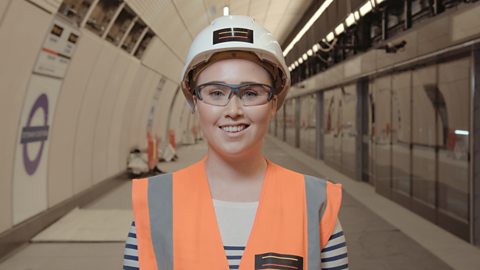
Explore careers by job sectors
Looking for job inspiration? Check out BBC Bitesize Careers job profiles to help you get started.
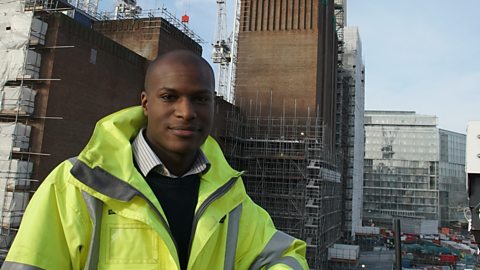
More from Bitesize Careers
Hear from young people about the world of work.
